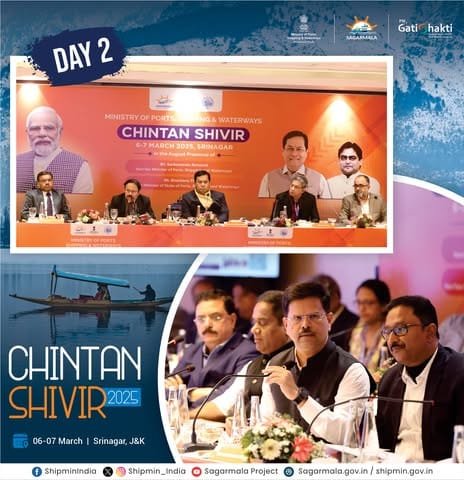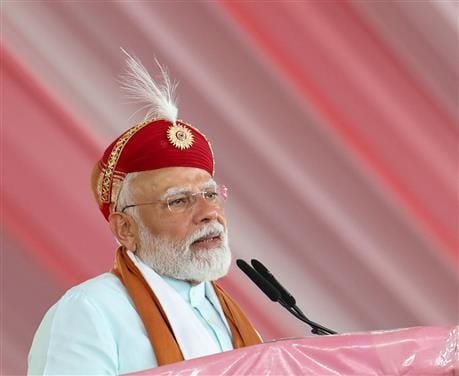Offshore Wind Energy Project Strategy issued for 37GW
To augment infrastructure needed for steep RE trajectory, transmission plan has been prepared till 2030, Minister of State for Ministry of Power Shripad Naik has told Rajya Sabha on 16 Dec.
Scheme for setting up of Ultra Mega Renewable Energy Parks is being implemented by providing land and transmission infrastructure for developers of large-scale projects, he said, highlighting the Government initiatives in promoting green energy across the country http://mnre.gov.in.
“Strategy for Establishments of Offshore Wind Energy Projects” has been issued indicating a bidding trajectory of 37GW by 2030 and various business models for project development, he elaborated https://www.conexpoconagg.com/.
These are among the updated steps and initiatives take to promote and accelerate renewable energy capacity in the country to realize the commitment of 500 GW non-fossil energy capacity by 2030 https://sbi.com.in/.
The Minister also highlighted:
Ministry of New & Renewable Energy (MNRE) has issued Bidding Trajectory for issuance of RE power procurement bids of 50 GW/annum by Renewable Energy Implementing Agencies from FY 2023-24 to FY 2027-28 https://www.iea.org/.
Foreign Direct Investment (FDI) has been permitted up to 100 percent under the automatic route.
Inter State Transmission System (ISTS) charges have been waived for inter-state sale of solar and wind power for projects to be commissioned by 30th June 2025, for Green Hydrogen Projects till December 2030 and for offshore wind projects till December 2032 https://www.digitalasiahub.org/.
To boost RE consumption, Renewable Purchase Obligation (RPO) followed by Renewable Consumption Obligation (RCO) trajectory has been notified till 2029-30. The RCO which is applicable to all designated consumers under the Energy Conservation Act 2001 will attract penalties on non-compliance.
Standard Bidding Guidelines for tariff based competitive bidding process for procurement of Power from Grid Connected Solar, Wind, Wind-Solar Hybrid and Firm & Dispatchable RE (FDRE) projects have been issued.
Schemes such as Pradhan Mantri Kisan Urja Suraksha evam Utthaan Mahabhiyan (PM-KUSUM), PM Surya Ghar Muft Bijli Yojana, National Programme on High Efficiency Solar PV Modules, National Green Hydrogen Mission, Viability Gap Funding (VGF) Scheme for Offshore Wind Energy Projects have been launched.
Laying of new transmission lines and creating new sub-station capacity has been funded under the Green Energy Corridor Scheme for evacuation of renewable power.
The Offshore Wind Energy Lease Rules, 2023 have been notified vide Ministry of External Affairs notification dated 19 Dec 2023, to regulate the grant of lease of offshore areas for development of offshore wind energy projects.
Electricity (Promoting Renewable Energy Through Green Energy Open Access) Rules, 2022, has been notified on 06th June 2022 with objective of ensuring access to affordable, reliable, and sustainable green energy for all.
Green Energy Open Access is allowed to any consumer with contract demand of 100 kW or above through single or multiple single connection aggregating Hundred kW or more located in same electricity division of a distribution licensee.
Green Term Ahead Market (GTAM) has been launched to facilitate sale of Renewable Energy Power through exchanges.
To achieve the objective of increased domestic production of Solar PV Modules, the Government is implementing the Production Linked Incentive (PLI) scheme for High Efficiency Solar PV Modules with an outlay of Rs.24,000 crore. This will enable manufacturing capacity of Giga Watt (GW) scale in High Efficiency Solar PV Module.
The Government, he said, has taken various measures for integration of RE sources in to the national grid to ensure reliability and stability:
Development of intra-state transmission network is being planned to keep pace with RE capacity addition. Strong inter connection of ISTS RE schemes with the intra-state network to ensure better reliability in terms of anchoring voltage stability, angular stability, losses reduction etc. is being done.
Flexibilization of thermal generation is mandated to address the variability of RE generation.
CEA (Technical Standards for Connectivity to the Grid) Regulations lay down the minimum technical requirements for the RE generating plants to ensure the safe, secure and reliable operation of the grid. The compliances to the said regulations by RE plants are verified jointly by Central Transmission Utility (CTUIL) and Grid-India/RLDCs before granting connectivity and interconnection to the national grid. Robust compliances verification is done before interconnection of any new plant to the grid.
Indian Electricity Grid Code mandates that RE plants participate in the primary and secondary frequency control in case of contingencies. Hybrid RE power plants, Energy Storage Systems such as BESS and PSP are being promoted for mitigating variability in RE generation and provide adequate frequency support to the grid, said the Minister. Fiinews.com










